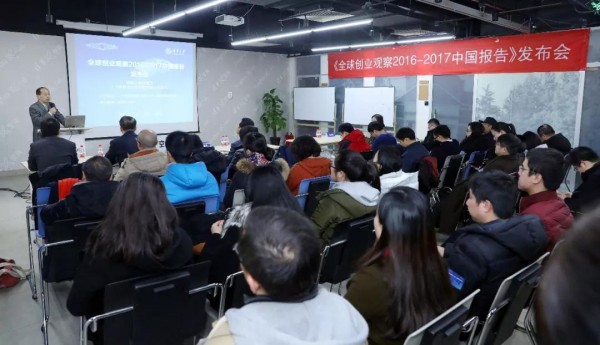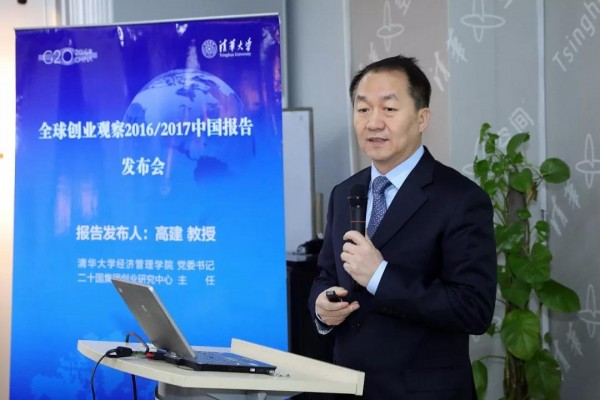GEM 2016/2017 China report released in Beijing
2018-02-05
Research findings on the China segment of the Global Entrepreneurship Monitor 2016/2017 (GEM 2016/2017) were announced at Tsinghua Science Park in Beijing, on Jan 27.
The China report was co-prepared by Tsinghua University's Entrepreneurship Research Center on G20 Economy and the Tsinghua University TusPark Research Institute for Innovation of Tus-Holdings, which is affiliated to Tsinghua Holdings.

Research findings on the China segment of the Global Entrepreneurship Monitor 2016/2017 (GEM 2016/2017) is released in Beijing on Jan 27.
Themed on "China's entrepreneurial quality, environment, and international comparison", the report uses the factors of innovation, development and level of internationalization to analyze the quality of entrepreneurial activities and change of entrepreneurial environment within China.
By shedding light on the commonalities and differences of entrepreneurial activities organized in China and in the other members of the G20, the report provides suggestions for the advancement of China's entrepreneurial activities.

Gao Jian, Chinese head of the GEM, secretary of Party Committee of Tsinghua University's School of Economics and Management, and director of Tsinghua University's Entrepreneurship Research Center on G20 Economy, announces the research findings.
The Tsinghua University's Entrepreneurship Research Center on G20 Economy and the Tsinghua University TusPark Research Institute for Innovation have been jointly dedicated to the GEM project for years, studying China's entrepreneurial behavior and entrepreneurship situation from different perspectives. The GEM 2016/2017 China Report was released by China Entrepreneurship Research Center under Tsinghua University's Entrepreneurship Research Center on G20 Economy and is their 14th annual report.
With a broad range of topics, the past reports have had a significant influence on China's entrepreneurial research and practice and have gained wide social acceptance.
Main research findings from the China segment of the GEM 2016/2017
First, statistics on innovation, growth and the level of internationalization of Chinese entrepreneurial companies during the past 10 years show that the quality of China's entrepreneurial activities has been improving. In terms of China's early-stage entrepreneurial activity structure, the proportion of opportunity-driven entrepreneurship has grown from 50.87 percent in 2009 to 70.75 percent in 2016/17.
1. In 2016/17, nearly 70 percent of Chinese startups developed innovative products and more than 30 percent of them expanded new markets.
In 2009, 20.19 percent of Chinese entrepreneurs believed their products or services were innovative, while in 2016/17, the proportion reached 28.76 percent.
2. In terms of growth, in 2009, 15.65 percent of Chinese entrepreneurs saw big growth potential for their business to create 10 or more jobs in the next five years. In 2016/17, the proportion was 22.74 percent.
3. Chinese entrepreneurs have seen visible growth in the number of overseas clients. In 2009, only 1.4 percent of them targeted global markets, but in 2016/17, 7.67 percent had overseas clients.
Second, China's entrepreneurial environment has improved with the comprehensive index for starting businesses in China increasing to 3.10 in 2016/17 from 2.87 in 2010.
Visible improvement can be seen in financial support and government policies, as well as social and cultural norms. However, slow or stagnating development remains in education and training, business environments and R&D transfer. Compared with other innovation-driven economies and the average level of G20 economies, China's business environment is in bad need of improvement.
1. In 2010, China's financial support, government policy and social and cultural norms in business environment scored 2.54, 2.66 and 2.97 respectively, while in 2016, they increased to 3.32, 3.02 and 3.47 respectively.
2. China's scores on improvement in education and training, business environment and R&D transfer were 2.38, 2.54 and 2.65 respectively in 2010. In 2016, they reached 2.61, 2.58 and 2.49 respectively.
3. Compared with developed economies and the average level of G20 economies, China's business environment should be strengthened. In 2016, the country's entrepreneurship environment scored 2.58 while Canada's was 3.39.
Third, similar to the other G20 economies, in China the young are the main players in entrepreneurial activities and people with high salaries are more inclined to start their own businesses. The whole society has a high acceptance of entrepreneurship and most people start business motivated by opportunity.
1. In China, most active entrepreneurs are between 18 and 34 years old, accounting for 44.39 percent of the total. The G20 average is 43.19 percent.
2. In China, entrepreneurs account for 13.84 percent of high-income groups (33 percent of the total population), while in those earning medium income, the proportion is 6.47 percent and in low-income groups is 6.9 percent. The G20 average in higher-income groups is 13.23 percent.
3. In China, 70.29 percent of interviewees believe that starting a business is a good career choice, 77.89 percent believe that successful entrepreneurs are well-regarded and enjoy high social status and 79.32 percent believe that entrepreneurs garner substantial media attention. The G20 average exceeds 60 percent in each of the three categories.
4. Without profitability has become the main reason for Chinese entrepreneurs to suspend their business; 38. 91 percent have done so. The G20 average is 30.66 percent.
Fourth, differences can be seen between China and the other G20 members in activity degree, the number of female entrepreneurs, educational background of entrepreneurs, entrepreneurship in the high value-added business service industry, and self-perceived capabilities.
1. In 2017, China's entrepreneurial activity index was ranking in the middle of the G20 bloc. The country's early-stage entrepreneurship activity (TEA) index was 10.5 percent, with 1.2 percent of entrepreneurial employees and 7.5 percent of mature enterprises.
2. In China, the female/male TEA ratio is comparatively balanced at 0.7. Indonesia has the highest ratio, reaching 1.2 and Japan has the lowest with 0.25.
3. In China, 47 percent of early-stage entrepreneurs have entered junior colleges or higher education, ranking in the middle of G20 countries but lower than the developed economies. The proportions in Canada, France and the US are 82 percent, 81 percent and 79 percent respectively.
4. The business service industry, which includes info-communication, finance and other services, has higher added value than the first and second sector industries, as well as the customer-oriented service industry.
China's proportion of entrepreneurship in the business service industry is comparatively low at 12.46 percent. Entrepreneurship in the customer-oriented service industry is the country's highest at 62.68. The UK, US and France have higher proportions of entrepreneurship in the business service industry, reaching 34.7 percent, 33.6 percent and 31.4 percent respectively.
5. Only 29.8 percent of Chinese entrepreneurs perceive themselves as having entrepreneurial capabilities but the G20 average is 44.86 percent.

 Facebook
Facebook WeiXin
WeiXin CONTACT US
CONTACT US










 Tsinghua Holdings works hard for better ecological environment
Tsinghua Holdings works hard for better ecological environment